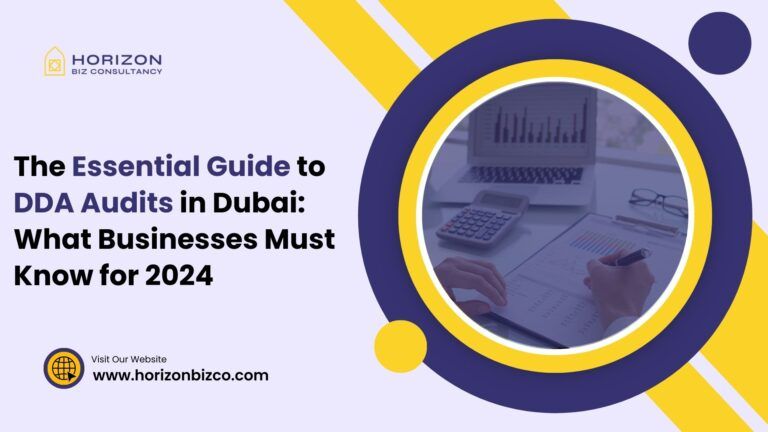The Department of Economic Development (DED) in Dubai has announced an increase in tax and financial audits, known as DDA audits, from 2025 onwards. All enterprises in the emirate need to understand these audits thoroughly and prepare accordingly to avoid penalties or payment obligations if selected for review.
This in-depth guide covers everything Dubai companies require to smoothly sail through DDA audits. It explains the reasons behind more audits, outlines changes coming in 2025, provides step-by-step readiness checklists, shares expert tips on managing audits, and answers the most frequently asked questions.
Why are DDA Audits in Dubai Being Increased?
Over the last few years, the number of DDA audits conducted on Dubai enterprises has already surged by over 40%. However, the DED plans on further increasing audits beginning 2024 to enhance compliance monitoring. This ensures taxes owed are fully paid and earnings honestly reported.
Businesses found violating rules or intentionally misreporting financial or tax details face stiff penalties. In severe fraud cases, licenses can be revoked entirely. By preparing thoroughly in advance, companies can avoid stressful audit surprises.
New DDA Audit Regulations Coming into Effect in 2025
The DED has outlined several modifications to DDA audit protocols applying from 2025. Enterprises must account for these updated guidelines in their readiness planning:
Enhanced Documentation Requirements
Firms may need to provide double the number of supporting documents compared to previous years when selected for review, as scrutiny depth increases. This includes financial statements, inventory lists, bank records, invoices, and materials validating taxes paid.
Stringent E-Invoicing Protocols
Dubai mandates e-invoicing between companies and government bodies. The digital invoicing framework will expand in 2025, with more extensive verification required before recording business-to-government (B2G) transactions. This improves reporting integrity.
Real-Time Data Submissions
In addition to information submitted during audits, enterprises may require periodic data sharing directly with the DED to enable continuous tax monitoring. Real-time status updates allow authorities to easily flag and quickly resolve discrepancies.
Live VAT Reporting Requirements
As per 2025 VAT rules, registered firms need real-time status updates on transactions and taxes. This means auditors can frequently cross-verify filings for consistency. Robust VAT accounting technology now becomes necessary.
Step-by-Step Checklist to Prepare for DDA Audits
While audits themselves may take 6-8 weeks, thorough preparation should start 12 months or more in advance. Here is a checklist:
Collect and Organize Financial Documents
Gather invoices, bank records, inventory lists, financial statements, VAT filings, and similar materials from the past 2-4 years. Save digital copies arranged logically by year and transaction type for easy access.
Verify VAT Accounting
Carefully examine your VAT workflows, tax codes, and filings to confirm tax collection from customers matches payments submitted quarterly to the DED within the allowed variance threshold.
Update Accounting Practices
Consult accounting experts to ensure your processes – bookkeeping, reporting, invoicing, documentation etc. align fully with 2025 DDA audit guidelines for smooth reviews later.
Automate Document Collection
Leverage digital tools that automatically aggregate and compile financial documents required in an audit via APIs. This saves significant manual effort.
Train Staff on New Rules
Educate your finance, accounting and sales teams on upcoming changes to reporting protocols through training workshops. Book external auditing professionals if required.
Expert Recommendations for Managing DDA Audits
If your company undergoes a DDA audit, stay calm and apply these proven tactics:
Appoint a Dedicated Audit Liaison Team
Have select senior finance and accounting personnel well-versed in protocols be your go-to audit liaison group. Ensure clear communication with auditors.
Provide Accurate Audit Responses
Answer all questions from auditors promptly and with full transparency. Admit to any errors identified instead of attempting to hide information. Penalties are lower for cooperative entities.
Resolve Problems Proactively
If issues like unremitted taxes appear, work earnestly with authorities on addressing them via additional payments or structured payment plans. This builds goodwill.
Learn from the Audit
Treat a DDA audit like a learning opportunity. Identify areas of accounting or tax procedures that require improvement to avoid repeat issues in future reviews.
Conclusion
As Dubai enterprises gear up for expanded DDA audit scrutiny from 2025, taking proactive readiness steps today to tighten finances, upgrade technology, and train personnel is key. This guide covers everything businesses need to smoothly sail through future audits. Reach out for any assistance!
FAQs
For most firms, audits occur once every few years. But increased assessments can happen if problems are unearthed or major tax policy changes introduced. High-risk sectors see more regular reviews.
Have financial statements, tax filings, bank records, invoices, inventory lists, VAT reports, and similar materials ready covering the past 2-4 years when the audit notice arrives.
Consequences include financial fines, added tax payments, suspension or cancellation of trade licenses, or even imprisonment for serious fraud. Conduct periodic self-audits to avoid issues.
A standard audit may take 4-8 weeks. Particularly extensive reviews with voluminous data could take a few months from initiation to closure in certain cases. Plan accordingly.
Yes, you can initiate the formal appeals process if you disagree with the audit outcome. However, strong documentation is vital to successfully demonstrate your appeal case.
The DED has an internal team of certified auditors. Reputed external accounting firms may also be commissioned for specialized assessments in some instances.





